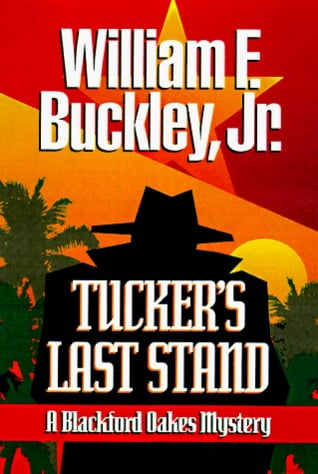A review of an early Blackford Oakes novel referred to Mr. Buckley’s handling of a sex scene as the Hardy Boys go to a bordello. In this, the ninth book in the series, Buckley demonstrates a surer grasp, one might say, of such matters. There is a sense in which Oakes’s missions for the CIA, reconstituted and romanticized from authentic events, are themselves a form of hankypanky. Buckley’s James Bondish hero really knows how to fool around.
This time William F. Buckley, Jr., places his hero in harm’s way with a story about the Vietnam War. As each adventure in the series brings us closer to the present day, Buckley loses some of the advantage of distance from the events being portrayed. Each of these novels contains large portions of contemporary history. He is most comfortable portraying the great, imagining what passes for small talk in their councils. There is an almost slapstick quality whenever President Johnson is on stage, and no one who reads this novel will ever forget (no matter how hard he might try) the description of LBJ in the nude. Buckley displays a genuine affection for Barry Goldwater, and some of his funniest dialogue is reserved for exchanges between Mr. Conservative and his handlers. He finds irresistible the temptation to recycle one-liners and clever editorial commentary from National Review and to place them in the mouths of his political characters.
The only trouble with all this admittedly entertaining stuff is that it overshadows the novel. The problems faced by Oakes and his partner, one Tucker Montana, in interdicting traffic on the Ho Chi Minh Trail can’t hold a candle to all the scheming going on behind the scenes for the 1964 presidential election. It is not that Buckley stints on action or danger—each one of these novels fulfills the criteria of the spy genre—but that his interest lies more with those who formulate policy than with the poor bastards who have to carry it out. And yet his heart is with the latter: a genuine sympathy infuses particular scenes that depict a divided humanity, facing itself across the barricades.
Part of the interest in Tucker’s Last Stand is in that tension between what Mao so aptly termed hearts and minds. A number of critics have compared the Oakes novels to the work of John Le Carre, but this clearly is a mistake. That Buckley avoids the potboiler aspect of the genre is incontestable, but he is still very much writing melodramatic fare about good guys and bad guys. Le Carre uses the settings and props of spy fiction to ignore the genre, and to write a different breed of novel entirely. The moral ambiguity of Le Carre’s universe is what Buckley is going up against.
This is especially evident in the latest novel, where the main character is not really Blackford Oakes but Tucker Montana (shifting the focus to other characters is a method Buckley frequently employs to keep the series from going stale). Tucker is the emotional opposite of a Le Carre character, but he has had the sort of experiences that sour a spy and make him think about coming in from the cold. In other words, he thinks like an adolescent in a world of adults—which is how his creator manages to put across a strong element of romanticism.
For with a subject as unpopular as the Vietnam War, Buckley needs to be able to play it both ways. There is no compelling reason for Blackford Oakes to be under a cloud of gloom concerning his latest covert operations (stagemanaging the Gulf of Tonkin incident), except that both author and reader know the war will be a disaster for the United States. One wonders if Tucker Montana’s divided loyalties might receive less sympathy from his friend Blackie if the war were not foredoomed. As it is, Buckley allows his most sympathetic character yet to suffer from what might be called atomic angst; and in true pulp-fiction style. Tucker is a guy who has enough expertise, and sufficient experience, to fill resumes for a dozen illustrious careers (among other things he did technical work on the Hiroshima bomb).
Whenever this novel threatens to become a techno-thriller, and the background seems excruciatingly thorough, we are reminded of the human being behind the lectures: Tucker Montana, the overgrown kid, whom Rufus the spymaster refers to as a genius who isn’t very bright. He is a man who can single-handedly wipe out a platoon in the Philippines, or singlehandedly devise a system of automatic sensors to bedevil the enemy he insists upon calling gooks, but who is helpless against the most consistently recurring problem in the Blackford Oakes novels: women.
Whether it is Oakes himself, unable to win true devotion from long-suffering Sally, or the latest in a series of supremely competent warriors who are so desperate for love that they will believe any lie spoken by alluring lips, these novels are modern in the chasm they both dread and celebrate. In Nietzsche’s phrase, the abyss looks back into the men who contemplate it, because they have the capacity for idealism. But in Buckley’s fiction, women are the abyss. Betrayal is as natural as a sigh, and as predictable as tomorrow’s guilt. In the face of such sadness, dreams of peace deserve nothing more than a funeral shroud.
[Tucker’s Last Stand, by William F. Buckley, Jr. (New York: Random House) 259 pp., $19.95]

Leave a Reply